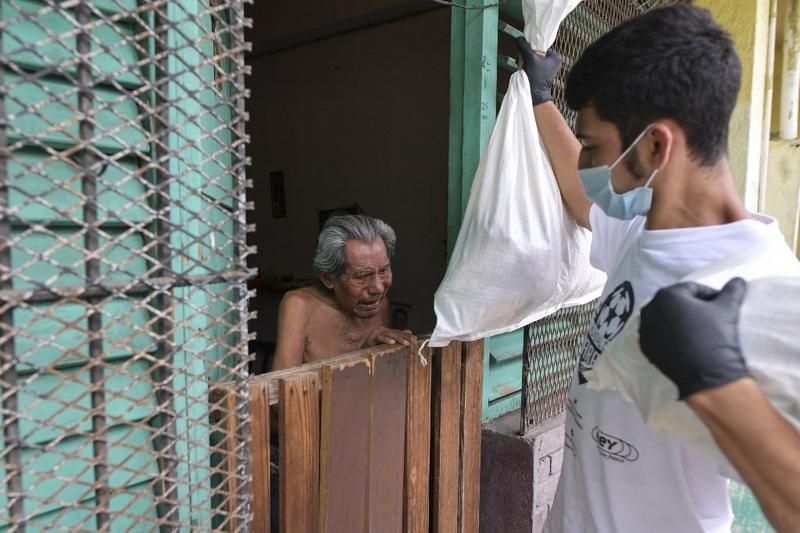 A volunteer delivers food to low-income families at the El Chorrillo neighborhood in Panama City on April 1, 2020. (LUIS ACOSTA / AFP)
A volunteer delivers food to low-income families at the El Chorrillo neighborhood in Panama City on April 1, 2020. (LUIS ACOSTA / AFP)
UNITED NATIONS/RIYADH - Executive Director of the World Food Programme (WFP) David Beasley on Tuesday warned of a hunger pandemic across the world in tandem with the coronavirus pandemic.
"At the same time while dealing with a COVID-19 pandemic, we are also on the brink of a hunger pandemic," he told the Security Council in a virtual briefing.
"In my conversations with world leaders over the past many months, before the coronavirus even became an issue, I was saying that 2020 would be facing the worst humanitarian crisis since World War II for a number of reasons," he said.
A WFP analysis shows that another 130 million people could be pushed to the brink of starvation by the end of 2020 due to COVID-19, the WFP chief said
ALSO READ: UN: Global hunger could double due to COVID-19 blow
"So today, with COVID-19, I want to stress that we are not only facing a global health pandemic but also a global humanitarian catastrophe. Millions of civilians living in conflict-scarred nations, including many women and children, face being pushed to the brink of starvation, with the specter of famine a very real and dangerous possibility," he told the Security Council in a debate on the protection of civilians affected by conflict-induced hunger.
Up to 821 million people go to bed hungry every night all over the world - chronically hungry. There are a further 135 million people facing crisis levels of hunger or worse, he said, citing the latest Global Report on Food Crisis.
That means 135 million people are marching toward the brink of starvation. But a WFP analysis shows that, due to the coronavirus, an additional 130 million people could be pushed to the brink of starvation by the end of 2020, he said.
Beasley warned that there is a real danger that more people could die from the economic impact of COVID-19 than from the disease itself.
The WFP chief warned that there is a real danger that more people could die from the economic impact of COVID-19 than from the disease itself
The economic and health impacts of COVID-19 are most worrisome for communities in countries across Africa as well as the Middle East, because the virus threatens further damage to the lives and livelihoods of people already put at risk by conflict, Beasley said.
READ MORE: UN: Hundreds of thousands of kids could die due to recession
"First and foremost, we need peace. As the secretary-general recently said very clearly, a global cease-fire is essential," said Beasley.
He asked for swift and unimpeded humanitarian access to all vulnerable communities, as well as uninterrupted food supply chains.
The WFP is the logistics backbone for the humanitarian world and even more so now for the global effort to beat this pandemic, said Beasley.
The WFP is requesting a further US$350 million to set up a network of logistics hubs and transport systems to keep humanitarian supply chains moving around the world. They will also provide field hospitals and medical evacuations to the front-line humanitarian and health workers, as needed and strategically.
"If we don't prepare and act now - to secure access, avoid funding shortfalls and disruptions to trade - we could be facing multiple famines of biblical proportions within a short few months," warned Beasley.
Food price volatility
In a separate virtual meeting, the agriculture ministers of the Group 20 (G20) countries vowed to guard against unjustified coronavirus measures that could lead to excessive food price volatility in the international markets.
A statement of the meeting released by the G20 Saudi Presidency reaffirmed the work to ensure continued flow of food, products, and inputs essential for agricultural and food production across borders, adding that emergency measures during the pandemic should not create barriers to trade or disruption to global food supply chains.
The ministers also vowed to work to ensure the health, safety, welfare, and mobility of workers in agriculture and throughout the food supply chain.
Officials from G20 countries highlighted cooperation with relevant international organizations to strengthen international cooperation to limit the impacts of COVID-19 on food security.


